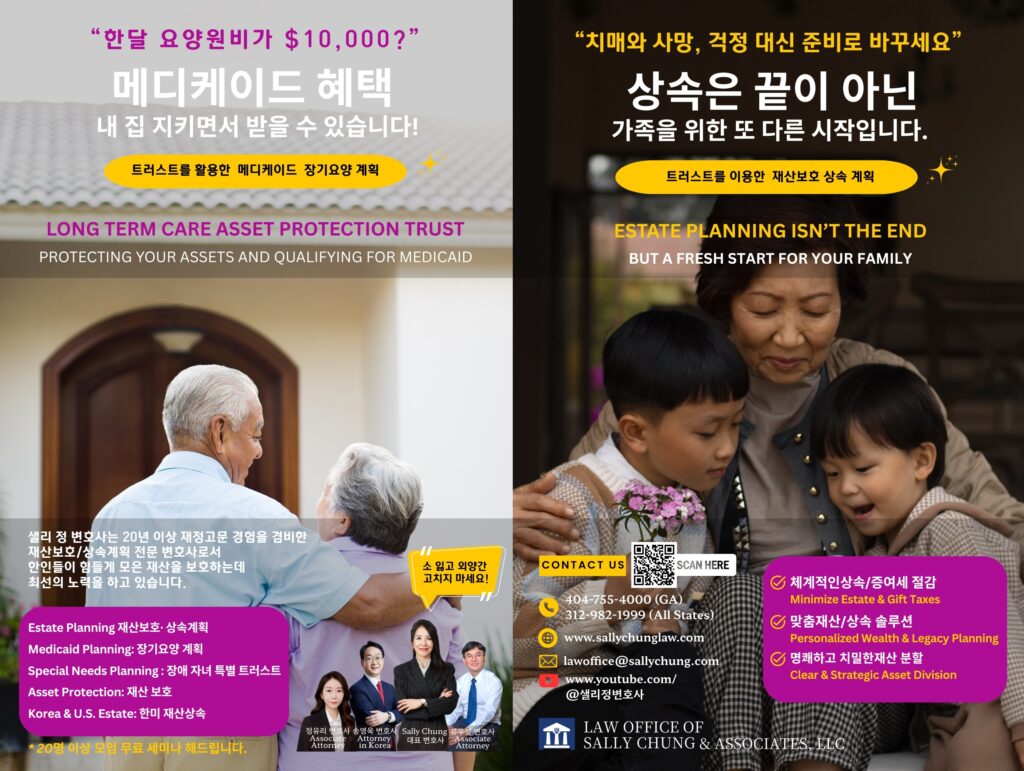
01 Dec Gifting Your Home Early Could Lead to Regret
Some people choose to transfer ownership of their home to their children in advance, either by gifting the title outright or by changing it to joint tenancy, based on the hope of qualifying for government benefits or due to common misconceptions. However, handing over property rights to your children during your lifetime is rarely a wise decision.
One major drawback of gifting a home while still alive is the capital gains tax. If a home is inherited after death, it receives a step-up in basis meaning the property is valued at the market price on the date of the parent’s death, and the child will not owe capital gains tax if the home is sold. But if the parent gifts the home while still living, the child inherits the original purchase price as the cost basis and may end up owing a large amount in taxes.
For instance, if Mr. Kim bought a house long ago for $100,000 and its value has now increased to $500,000, gifting the house to his son during his lifetime would mean the son assumes the original $100,000 basis. If the son later sells the house, he will owe capital gains tax on the $400,000 gain. However, if the home is passed down as an inheritance through a trust, the son receives a step-up in basis based on the home’s value at the time of Mr. Kim’s death, and no capital gains tax would be due.
Moreover, many Korean Americans are unaware that transferring or gifting a home may require filing a gift tax return. Failing to do so could result in penalties later on.
In addition, if the child is sued or declares bankruptcy, the gifted property is not protected and may fall into the hands of creditors. This is especially risky if the child is running a business or works in a profession where legal liability is high. You may want to believe that nothing bad will happen to your child, but if your child is involved in a car accident and causes injuries beyond what insurance covers, the property you gifted may be used to pay damages. Another concern is the possibility of divorce. It’s not a pleasant statistic, but the divorce rate in the U.S. is over 50%, and in most cases, it is extremely difficult to keep gifted property out of the marital asset division. Any property transferred to your child in advance is considered their personal asset, and therefore cannot be protected from personal liabilities such as lawsuits or divorce.
There is also the possibility that the parent may change their mind about gifting the home while still alive. As they grow older, they may wish to move to a quieter, warmer place, or downsize to a smaller, more affordable home to enjoy a better retirement. But if ownership has already been transferred or if the child is a co-owner, the parent must obtain the child’s consent to sell or move. It’s fortunate if the child agrees, but matters can become complicated, especially if the child has a spouse.
Even when it comes to repairing the home or applying for a loan, the child may assert their ownership rights and refuse. In some cases, once ownership is transferred, the child’s attitude may change, they may neglect their parents or even evict them from the house.
To avoid such outcomes, it is recommended to transfer the home into an Asset Protection Trust. By naming the children as beneficiaries of the trust, the property can be protected from the child’s creditors, divorce, or irresponsible spending. It also offers potential tax benefits, and the parents retain the right to live in the home for the rest of their lives. Furthermore, if five years pass after establishing the trust, the property is no longer counted as an asset when applying for long-term care Medicaid benefits.
Additionally, a home held in this kind of trust is not subject to estate recovery, the process by which Medicaid seeks reimbursement from a deceased person’s estate for benefits paid during their lifetime.


